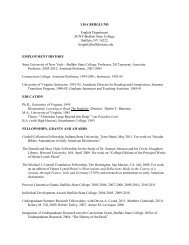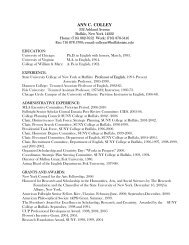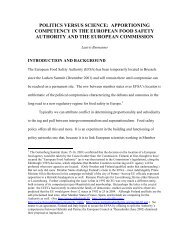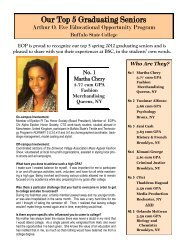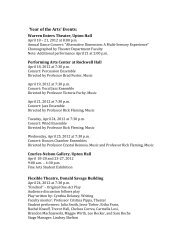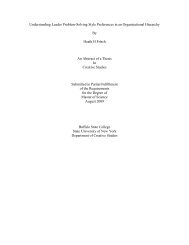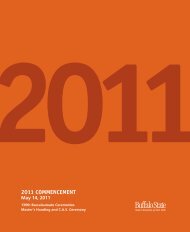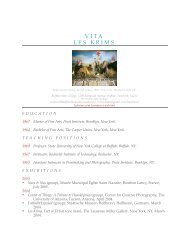Arts - Buffalo State College
Arts - Buffalo State College
Arts - Buffalo State College
You also want an ePaper? Increase the reach of your titles
YUMPU automatically turns print PDFs into web optimized ePapers that Google loves.
112<br />
Psychology and Social Sciences<br />
Democracy In the United <strong>State</strong>s and China<br />
Adonis Kernen, SOC 208: Sociology of Contemporary China<br />
Faculty Mentors: Professor Jie Zhang, Sociology, Professor Eric<br />
Krieg, Sociology, and Professor Amitra Wall, Sociology<br />
At either the international political level or the inter-subjective<br />
personal level, the ability to understand others is a valuable<br />
skill. In the Western World, democracy is a universal goal; yet, it<br />
is highly variable. This research examines the roles that social<br />
perception and culture play in the construction of the idea of<br />
democracy. This research also examines literature and shows how<br />
sociological concepts can enhance a multicultural understanding of<br />
“democracy”. In China, the democracy “ideal” is often challenged by<br />
the Western World view.<br />
Presentation Type and Session: Oral – Social Sciences<br />
Digitizing Corporal Collections<br />
Brandi Simmang, ANT 495: Cataloging Bones<br />
Faculty Mentor: Professor Julie Wieczkowski, Anthropology<br />
The Department of Anthropology has a substantial collection<br />
of natural human skeletal remains. The collection is used for the<br />
upper division courses ANT 324 Human Skeleton and ANT 325<br />
Forensic Anthropology, as well as for independent studies. However,<br />
there is currently no database with easily accessible information<br />
about these remains. The goal of this project is to create a database<br />
to aid in teaching and research. The museum cataloguing software<br />
“Past Perfect” was used for this project. The completed database<br />
will include information from previous independent studies (bone<br />
measurements, stature, age and antemortem skeletal anomalies)<br />
as well as notes about the general condition of the bone. A bar code<br />
will be assigned to each bone individually. This bar code allows for<br />
quick access to the information associated with the bone or human<br />
skeleton. The software allows for more information to be shared,<br />
stored, secured and retrieved. Finally, the outcome of this project is<br />
to create a collective body to hold and store current information in<br />
order to assess what still is needed to be researched on the skeletal<br />
collection. Students in the future will contribute information to the<br />
database.<br />
Presentation Type and Session: Poster II<br />
Distinguishing Defiant Drinkers<br />
James Harter, PSY 496: Honors Thesis<br />
Faculty Mentor: Professor Michael MacLean, Psychology<br />
In a recent study done by MacLean and Harter (2011), a new<br />
college drinking motive, known as defiance, was endorsed by 68%<br />
of current drinkers and found to be significantly related to alcohol<br />
use and alcohol-related problems. Defiance drinking is drinking<br />
because it is forbidden and one wishes to defy parental and/or<br />
societal restrictions, perhaps as a way of demonstrating autonomy<br />
and independence. Another possible motive explored is drinking as<br />
an excuse. Excuse drinking is blaming alcohol as to why something<br />
can’t be done and/or to escape responsibility. The current study<br />
has two objectives. The first objective is to develop reliable and<br />
valid scales for measuring defiance and excuse drinking motives<br />
among college drinkers and will involve enhancing, refining and<br />
evaluating the defiance and drinking as an excuse scales developed<br />
by MacLean and Harter (2011). The second objective is to identify<br />
subsets of college drinkers based on their drinking motives with a<br />
particular focus on examining how those who drink primarily for<br />
defiance and excuse reasons differ from those who drink for other<br />
reasons. Participants will be college students (ages 18-21) primarily<br />
from <strong>Buffalo</strong> <strong>State</strong> <strong>College</strong>. Collection of data will occur through<br />
the use online and paper versions of the survey. In order to test the<br />
validity and reliability of the defiance and drinking as an excuse<br />
scales, confirmatory factor analyses will be run. In order to discover<br />
possible subsets of defiance drinkers, cluster analysis will be run.<br />
Data collection is in progress and results will be presented at the<br />
conference.<br />
Presentation Type and Session: Poster III<br />
Economy of Refugees: What Factors<br />
Contribute To Employment Status of<br />
Liberian Refugees In <strong>State</strong>n Island, New<br />
York?<br />
Khadijat Olagok, PSC 330W: US Foreign Policy<br />
Faculty Mentor: Professor Kyeonghi Baek, Political Science<br />
What is the employment state of Liberian refugees in <strong>State</strong>n<br />
Island, New York? I conducted phone surveys of 300 hundred<br />
respondents and a series of interviews and find that half of the<br />
participants had a U.S elementary education level (equivalent to<br />
the US 6th grade level education), while the rest of the participants<br />
have between a middle school, high school and college levels of<br />
education. I also find that over 50 percent of the participants are<br />
fluent in English. Many of the Liberian refugees who live in <strong>State</strong>n<br />
Island are often subjected to menial jobs. The transition from Liberia<br />
to America with little to no work experience has made it difficult<br />
for Liberians to thrive in <strong>State</strong>n Island. I argue that Liberians are<br />
at a disadvantage when it comes to seeking stable and high paying<br />
employment because of discrimination and the lack of government<br />
support.<br />
Presentation Type and Session: Poster III<br />
The Effect of Predator-Stimulus Exposure<br />
On Defensive Responding In Rats<br />
Melissa Young, Psychology and Chris Cejka, Psychology<br />
Faculty Mentor: Professor Jean DiPirro, Psychology<br />
This research is designed to gain insight into the effect of<br />
predator-stimulus (i.e., cat scent) exposure on defensive responding<br />
in rats. Studies in our behavioral neuroscience laboratory, among<br />
many others, have shown that cat scent (i.e., a cloth exposed to<br />
the dander of a live cat for 7 days) is sufficient to induce defensive




